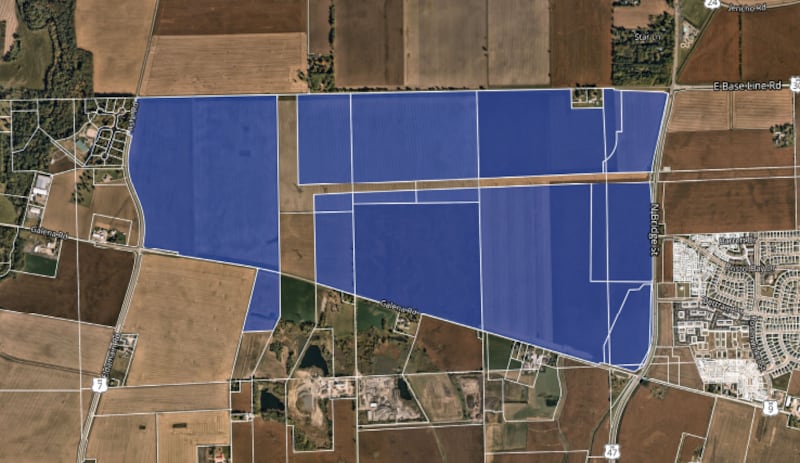While the crucial votes for the proposed 1,037 acre Project Cardinal data center in Yorkville have been delayed to late August, community members cautious of the project are not waiting to make their voices heard.
With “a fair amount to be resolved” with the annexation agreement and the planned unit development agreement for the data center campus, the necessary votes by the city council have been delayed to some date between Aug. 12 and late August, City Administrator Bart Olson said.
The data centers came up at the City Council meeting on July 22.
While the project, which proposes 14-two story data center warehouses, would be built in phases over at least a decade, those wary of the development said the speed of the project’s approval process has left them with several concerns unanswered.
John Bryan, resident of Legacy Estates, said neither the developers nor the city have said how they will prevent the construction density from getting out of control. He said he expects “tens of thousands” of trucks alone just to pour the project’s foundation.
“I am knee deep in research on these data centers, and I haven’t had a lot of time because this thing was basically thrown on me in the very early part of May,” Bryan said during the July 22 City Council meeting. “The deeper I dig, the closer to hell I get.”
The 14 warehouses will total more than 17 million square feet with two electrical substations and 3,750 parking spaces. The site, which requires 305 acres to be annexed by the city before all 1,037 acres are rezoned to manufacturing, is located northwest of Illinois Route 47 and Galena Road, south of Baseline Road, and east of Ashe Road.
:quality(70)/cloudfront-us-east-1.images.arcpublishing.com/shawmedia/IGDRYERJCVDZ3DY4P5G46FFF4I.png)
Attorney Bernie Weiler, representing a neighboring subdivision, said with so many unknowns regarding how the project will affect neighboring residents, approval should not be rushed. He said construction should begin furthest away from existing homes while some of the potential harmful effects of living near data centers are better studied with mitigation solutions devised.
“You have the power to organize it in a fashion that is rationally based upon concern for the residents, this is not only for residents of the community I represent, but for other residential communities that ought not to be the guinea pigs for this,” Weiler said during the meeting.
Yorkville currently is considering 3,000 acres for development of multiple data center campuses. At several public hearings, community members have spoken out against having so much manufacturing built near their homes, with concerns ranging from potential health issues, decreased property values, to the ruined rural landscape.
Weiler said the developers plans to start construction from the west to the east should not be approved considering it’s closest to the highest number of homeowners. He suggested the city negotiate to build closer to IL Route 47 with ComEd.
“[They should] start on Route 47, which is going to be a four-lane highway, and people can just drive past it, they’re not going to have to live next to it,” Weiler said.
The city is requiring all data center buildings to be more than 500-feet from the nearest residential or commercial structure. They also must have an 8-foot-tall berm along the perimeters, and a 100-foot landscape buffer from roadways.
At past meetings, Mayor John Purcell likened the benefit the larger data center campuses would bring to the community as more in value than bringing a Chicago Bears football stadium to town.
City officials have said they favor the developments because they generate substantial tax revenues for the city without bringing in large populations of people like new residential developments which would further exacerbate the Yorkville School District 115’s student capacity crisis.
The developers must adhere to a sound pollution mitigation study, and create plans ensuring they do not exceed the city’s current noise ordinance regulations. During the meeting, Olson said the developers said they will meet the sound requirements.
Weiler said the studies do not address residents’ concerns about the constant low-tone sound emissions that are not measured by the decibel studies or the high-pitched sound emissions coming from the air cooling equipment. He said constant exposure to these types of constant sound pollution could potentially cause health concerns.
“We’re not convinced we know what the effect of that is going to be,” Weiler said. “There are places to build where that effect isn’t going to be heard by the residents until we know how to control it.”
Olson said the city is considering more than 100 data center warehouses over the next few decades that could generate millions of dollars in tax revenues annually for the city.
Mary Maher Bartalone, resident of Blackberry Shore Lane and the Bristol Township Assessor, said there needs to be greater balance in planning land usage.
“It doesn’t seem like the future of that is here when we have one campus of data center after another lining up,” Bartalone said. “Find some balance. We need businesses. We need the industry. We need people in residential housing. We need it all. It needs to grow at a rate that won’t collapse upon itself.”

:quality(70)/s3.amazonaws.com/arc-authors/shawmedia/0cef0bf9-a04e-4bb4-aea0-03d8ced01c00.jpg)